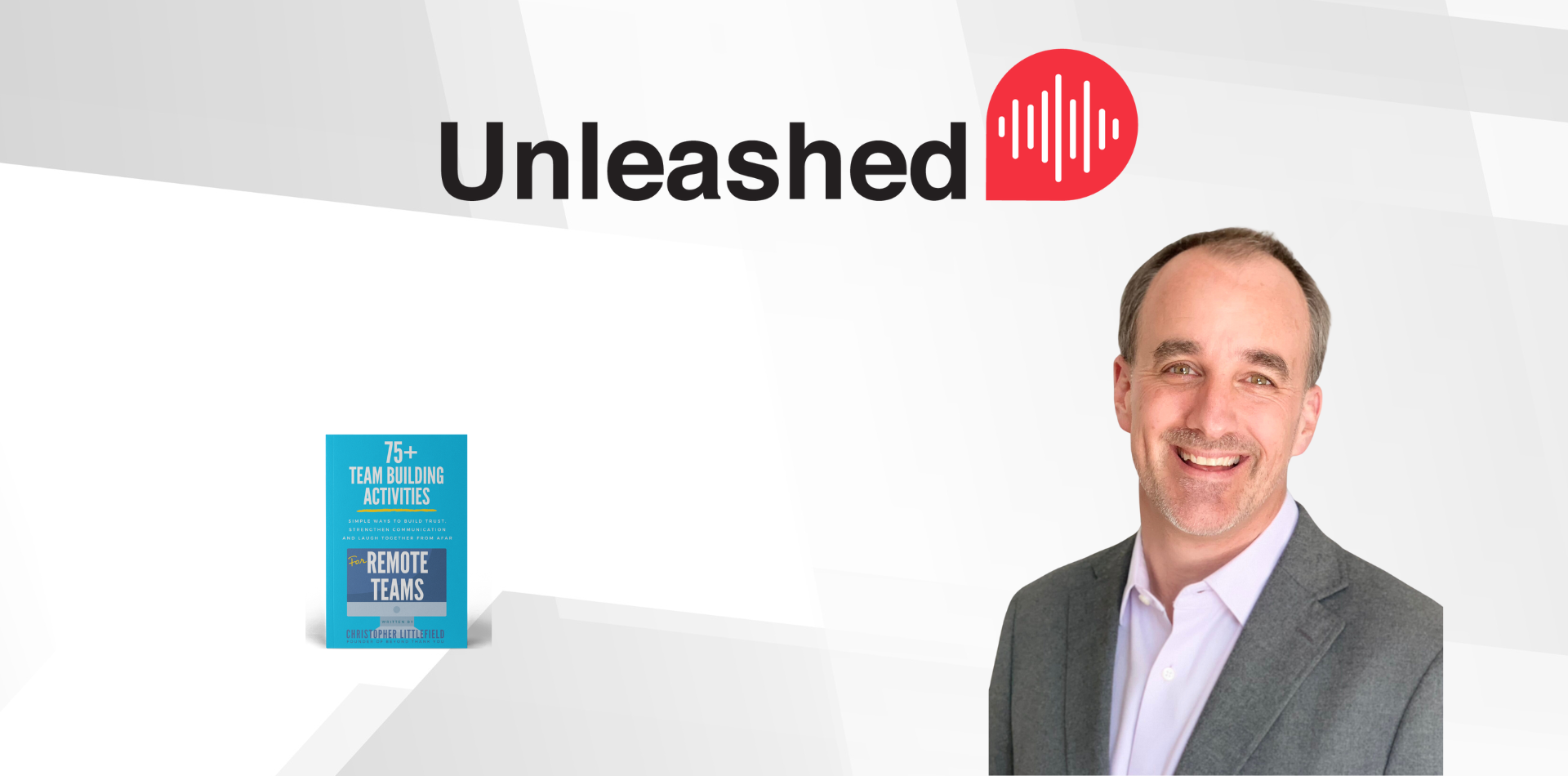Table of Contents
When tackling conflict resolution, we often go to great lengths to sidestep difficult discussions, opting instead for activities like ropes courses, paintball games, or daunting icebreakers.
However, these team-building exercises often serve as mere distractions. It's only when we confront the discomfort head-on and address the underlying issues that we can truly mend relationships and foster a healthier team dynamic.
In part one of our conversation with Christopher Littlefield, we talked about employee appreciation and the merits of properly recognizing the efforts of your team members. As you'll learn in this episode, appreciation goes hand in hand with conflict resolution. Let’s dive into this episode highlights.
Actions You Can Take Right Now
- Reframe the way you think about conflict resolution. Repairing a damaged relationship or team dynamic isn’t achieved by putting everyone in a fun or challenging environment (like a ropes course!) – it’s about creating an environment where people can be vulnerable.
- Don’t leave the Band-Aid on. Conflict resolution will always feel painful at first, but it won’t get any easier if you leave the wound to fester. Do the hard thing as soon as possible; have the tough conversation now to save months or even years of wasted time and relationship.
- Stop trying to get everyone to agree. Your goal is to get people to understand one another. It’s impossible to get everyone to agree, but if they can at least reach a place of understanding, their relationships will be better for it.
View or listen to this and other past episodes on the Unleashed Podcast Library
Episode Highlights and Excerpts
- As a leader, conflict resolution is one of the most crucial things to get right. The quality of the relationships in your team can make or break your entire culture, affecting your outcomes and success levels as a result.
- “If we want to actually shift the dynamics of our teams, we need to talk about the issues that got us to where we got to, and we need to figure out how to have those conversations in an open, honest, and constructive way.”
- So many leaders make the mistake of taking their teams on off-site excursions that don’t address the root of the problems taking place.
- These activities might be a helpful distraction, but when you return to the office with unresolved issues, they come right back to the surface.
- Instead, we need to create environments where everyone feels safe to be vulnerable about what is bothering them.
- So many leaders make the mistake of taking their teams on off-site excursions that don’t address the root of the problems taking place.
- Going into conflict is painful at first. It’s like running a marathon after you haven’t exercised in a long time. But as the leader, you need to spark the conversation and show people that it’s safe to have these discussions.
- Discussing the real issues within your team is crucial. Otherwise, you'll likely face more severe problems later on. By addressing these issues directly, you can prevent them from escalating further down the line.
- A huge part of conflict resolution is learning to handle your triggers. We’re never going to be able to not get triggered – it’s part of our DNA.
- A trigger begins with a stimulus (for example, a colleague rolling their eyes at something you say during a meeting). You then interpret the stimulus, have a physical reaction, and then react from a place of being triggered.
- Reacting impulsively rarely leads to constructive outcomes. Instead, it's important to recognize our triggers as they arise and learn to disengage from the situation in the moment.
- The more aware we are of our triggers, the more we start giving ourselves the ability to navigate those triggers. It becomes a conscious reaction instead of an unconscious reaction.
- A trigger begins with a stimulus (for example, a colleague rolling their eyes at something you say during a meeting). You then interpret the stimulus, have a physical reaction, and then react from a place of being triggered.
- Another key component of conflict resolution is reaching a place of understanding. You don’t need to agree – you just need to understand.
- As humans, we are never going to reach a place of total mutual agreement. It’s natural for us to have different perspectives and opinions.
- Sometimes, this means we arrive at conversations with the mindset that we are already right. We look for holes in the other person’s perspective and refuse to accept that we could be wrong.
- Our job is to understand where the other person is coming from – it’s not to figure out who is right and who is wrong.
- Understanding opens the door to better, healthier relationships. It allows you to resolve conflict more easily because no one is hung up on ‘right’ or ‘wrong.’ The focus is, “What do we need in order to feel okay about this?”
- As humans, we are never going to reach a place of total mutual agreement. It’s natural for us to have different perspectives and opinions.
- Priming is a strategy for going into a conversation that you know could get a bit tricky. It involves framing the situation and setting your intention before the conversation.
- How do I want to show up so I can be more intentional? If I do get triggered, what's one strategy I'm going to deploy to try to defuse it?
- These questions prepare you to handle issues as they arise in conversation. You are less likely to feel reactive if you’ve already prepared for possible triggers.
- How do I want to show up so I can be more intentional? If I do get triggered, what's one strategy I'm going to deploy to try to defuse it?
- A helpful way to think about your conflict resolution approach is ‘below-the-line’ and ‘above-the-line’. (Results Accountability Ladder)
- Operating above the line is open and positive. You take ownership of your actions. You are proactive about accountability and responsibility.
- Operating below the line is closed and negative. You are defensive, shameful, blame-driven, and in denial.
- In periods of conflict, be aware of your place either above or below the line. Are you taking ownership of your actions, or are you living in denial?
- Operating above the line is open and positive. You take ownership of your actions. You are proactive about accountability and responsibility.
- In a perfect world, everyone would take personal responsibility for their actions. This is typically not the case, however – so what can you do if someone is acting below-the-line?
- If you see somebody who should be taking personal responsibility, but they're not, you can’t force them. It’s not possible.
- What you can do is point out the impact of their behaviors, and you can hold them accountable for it.
- If you see somebody who should be taking personal responsibility, but they're not, you can’t force them. It’s not possible.
- The ultimate strategy for preventing and resolving conflict is to genuinely care about the people you work with – which is where appreciation comes into play.
- To practice radical candor effectively, we must first establish a relationship built on personal care and genuine value for the other person. This entails expressing our concern and appreciation for them while also providing honest feedback.
- If an employee feels like you care for them as a person and you are willing to be vulnerable back, they will then feel permission to be vulnerable with you.
- Without the foundation of a good relationship, conflict resolution is unlikely to be successful.
- To practice radical candor effectively, we must first establish a relationship built on personal care and genuine value for the other person. This entails expressing our concern and appreciation for them while also providing honest feedback.
Take Your Business to the Next Level
At Results we care about your success, we understand how overwhelming it can feel to run a business, and we’re here to help. Reach out to Nicole through our contact form for ways to unleash the potential of your business.
Visit the Unleashed Podcast Library where you’ll find exclusive conversations with world-class thought leaders, authors, and leadership experts.
Each episode of Unleashed is hosted by Results’ CEO Jeff Tetz who spends most of his day exploring what makes high performers tick and helping build a community of leaders who want to learn and grow together. Follow Jeff (Twitter; LinkedIn; Instagram) for more great leadership insights.
Access the Full Episode Your Way
Click the logo below to subscribe to your favorite platform and never miss another episode recording. Remember to subscribe to your favorite channel and be the first to know when new conversations are available.
Christopher Littlefield

Christopher Littlefield is an International and TEDx Speaker, an Expert in Employee Appreciation, Workplace Culture and the founder of Beyond Thank You. He has trained thousands of leaders, across six continents, on how to understand what their people want and need to be at their best. His clients include Accenture, Boston Medical, Lebanese Postal Service, MIT Sloan School of Management, Reserve Bank of Australia, Salesforce, the U.S. Army, the United Nations, and more. His work has been featured in New York, Inc, Mindful, and British Psychologies Magazines, and profiled in Harvard Business Review. Chris is a regular contributor to Forbes and Harvard Business Review and the author of the bestselling book, 75+Team Building Activities for Remote Teams.
You can learn more at Christopher's website.






